- Home
- Encyclopedia
- Pro-war Yet Pro-dissent: U.S. Senator Gale McGe...
Pro-war yet pro-dissent: U.S. Senator Gale McGee of Wyoming
In those days, Democrats gathered each election eve at a school gymnasium in a small town midway between Riverton and Lander, Wyo. Every statewide candidate felt obligated to make the pilgrimage. Some 600 Wyoming Democrats gathered from every corner of the state to Hudson on that Monday night in 1976. The speeches threatened to last all night, and Senator Gale McGee sat in a corner with Bill Sniffin, editor of the Lander-based Wyoming State Journal.
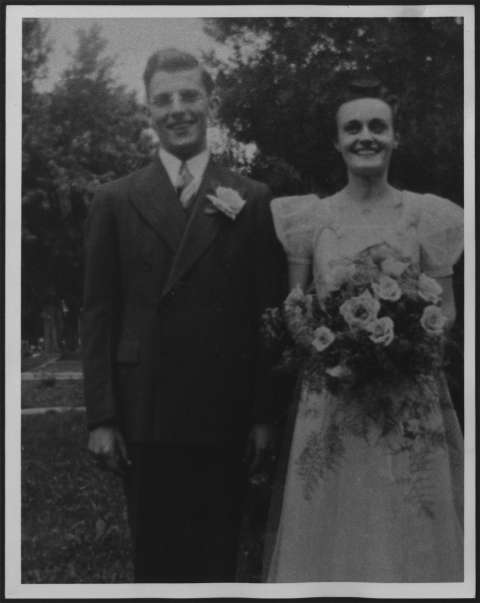
By then, the Vietnam War had been over for more than a year. The Pentagon Papers had been leaked and published and everyone knew an inconvenient truth: Neither President John F. Kennedy nor President Lyndon B. Johnson thought America could win the war. President Nixon’s illegal bombing of Cambodia had been unmasked. More than 56,000 American soldiers had been buried. The foremost congressional proponent of that war was sitting across from Mr. Sniffin, who wanted to know how Sen. McGee felt about the war in retrospect. “I was one of the biggest backers of our involvement there,” the Senator answered, “and in hindsight, it wasn’t wise that we were there.” [1]
A Washington dinner party
Walter Lippman, the popular Washington Post columnist, lived in an elegant home within view of the gargoyles guarding the Washington National Cathedral. In friendlier days, Lyndon Johnson felt welcome to “drop by and bum a drink.” [2] That changed when their friendship frayed because Lippman criticized LBJ’s post-1964 landslide re-election decision to escalate the war in Vietnam.
On a cold February evening in 1965, Lippmann hosted a small dinner party. Only three United States senators were invited. Lippman was looking for a deeper understanding of America’s role in Southeast Asia. His short guest list included Gale McGee of Wyoming.
In three terms as a senator and later as Jimmy Carter’s Ambassador to the Organization of American States, McGee was integrally involved in the most important issues of the day, including the enactment of Medicare and Medicaid, landmark civil rights and environmental protection laws as well as the creation of the Peace Corps and ratifying the Panama Canal Treaties.
But it was his unyielding support for the Vietnam War that most defined his political career. His role in advancing the cause of the war began in earnest at Lippmann’s dinner party, shared with senators Frank Church of Idaho and George McGovern of South Dakota. Their after-dinner conversation paved the way for one of the most important debates in the history of the Senate, a debate demonstrating that those with passionate differences on significant issues could engage one another respectfully in civil, fact-based discourse , though they differed considerably on a matter with enormous consequences for the nation and the world.
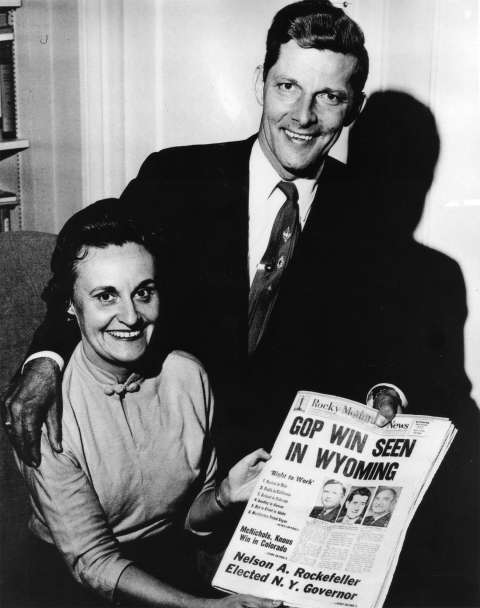
In the coming years, Church and McGovern advocated for U.S. withdrawal from the war altogether. In 1965, they supported a negotiated end to hostilities. McGee offered an alternative. He believed the greatest threat to world peace was China. If the U.S. didn’t confront the threat of a Communist takeover in Vietnam, he argued, China would extend its goals to other nations. Soon all of Asia would fall and the international balance of power would shift against the U.S.
In the course of their conversation over Walter Lippmann’s dinner table that evening, McGee recalled, “We kind of agreed officially to transfer this conversation to the floor of the Senate.” [3]
A hawk amid doves
The Senate debate opened Feb. 17, 1965, with Sen. Church quoting John F. Kennedy for the proposition that the United States “cannot impose our will on the other 94% of mankind.” [4] McGovern suggested that American support for South Vietnam’s government opened the door for Communist gains and delayed “the development of a responsible government.”
McGee disputed the call for a negotiated end, reminding his colleagues of the line the U.S. drew in Europe to stop Soviet expansion. “There should be the same sacred line in Vietnam.” McGee, a one-time college debate coach, was enjoying the give and take, calling it “fascinating and enlightening.”
He discounted his colleagues’ call for negotiations, claiming it would send a message to the Chinese that the U.S. was a “paper tiger, tired and ready to go home.” The Wyoming senator said a line should be drawn at the 17th parallel and that if “1,000 troops come over from the north, it requires a full division to match them.”
This exchange launched McGee’s status as the most significant supporter of the war in the U.S. Senate. Immediately, he became the “go-to” person to interview on TV and radio. Days later, he and McGovern, both PhD historians, appeared on a special CBS program entitled “Vietnam: The Hawk and the Doves.” The terms immediately described the divide in America between those who supported and those who opposed the war. [5]
An academic training
Not known until recently, Gale McGee was the best known of the Hawks, but had sought and received a Conscientious Objector designation in the lead-up to World War II, after telling his draft board, “I conscientiously object to serving in the armed forces of this country.” [6] Pearl Harbor changed that, causing McGee to try to enlist as a Navy pilot. When he was reclassified 1A, a draft physical disclosed he suffered from diabetes, a disease that would negatively affect the remainder of his life.
He then enrolled in a Ph. D. program at the University of Chicago. His three years there reversed his earlier flirtations with isolationism as he developed a different world view. As McGee researched and wrote dozens of academic papers on foreign policy, the future senator transitioned to a firm belief that the United States was obliged to be the leader in international politics. His 265-page doctoral dissertation concluded that a balance of power was necessary to protect U.S. security.
McGee concluded, “It (a balance of power) was a disposition that had constantly been in evidence since the birth of the Republic, and thus it better represents a ‘tradition’ in American policy than the so-called pole-stars of aloofness, isolation, and non-entanglement.” [7]
He defended his dissertation before two daunting academics whose views could not have been more different. Professor J. Fred Rippy was a Robert E. Lee devotee from Tennessee, an isolationist who was convinced America would “destroy itself in its repeated efforts to save the world.” [8] Across the table was the renowned expert on international law and politics, Dr. Hans Morgenthau, an internationalist who would eventually use his considerable intellectual abilities to argue for an end to the war in Vietnam.
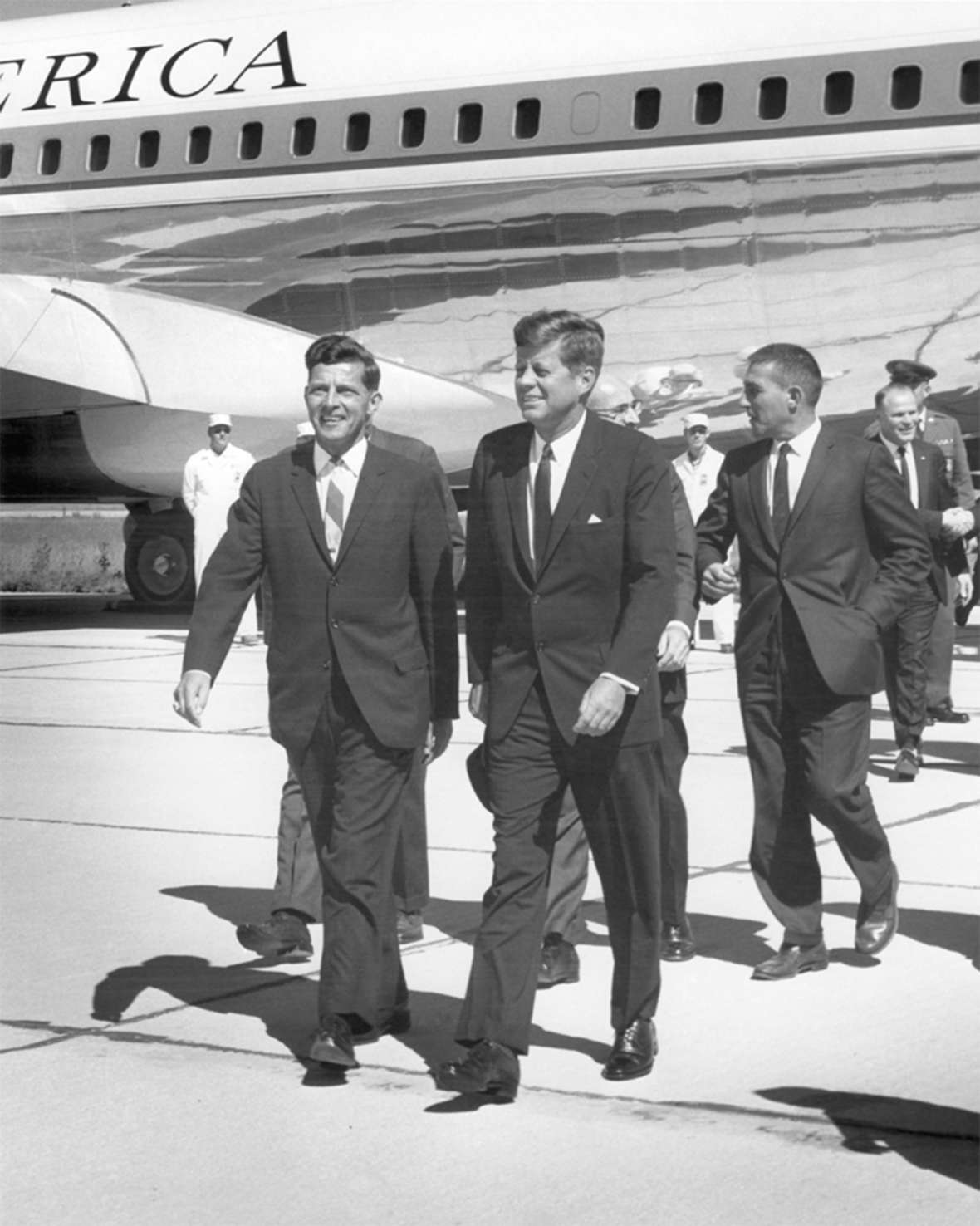
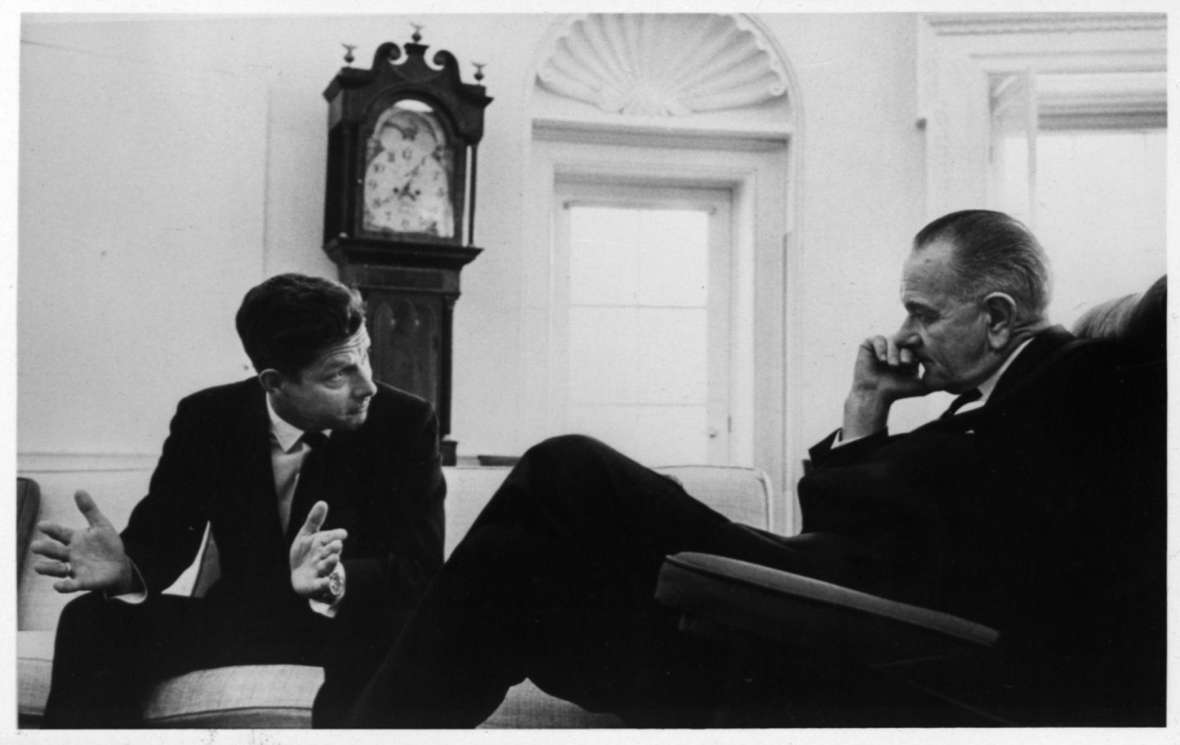
An unpopular war
McGee’s experience at the University of Chicago solidified a world view that served him as a history professor at the University of Wyoming and his 18-year career in the United States Senate including the years he remained the most ardent defender of an unpopular war.
It made no difference to the Wyoming senator whether a Democrat or a Republican was in the White House. As the war dragged on through the remainder of the Johnson presidency and into the Nixon years, before ending under Gerald Ford, Senator McGee held tight to his beliefs that the country had to take a stand against Communist expansion.
As draft calls increased and the weekly death toll began to shock the consciences of many Americans, the tone of the senator’s mail changed. While few of his Wyoming constituents wrote other than to support the war through 1966, that changed as more Wyoming young men were drafted and sent into harm’s way.
Arden Coad of Dubois was a friend and long-time political supporter. He had one son. Although a patriot, Coad advised his son to flee to Canada and refuse to serve even if it meant jail. His son, however, accepted his draft notice, believing it was his duty. Coad wrote McGee, saying, “You can’t change with a few angry words what you have taught for 18 to 20 years.” [9] Coad beseeched his friend and his senator “to keep our son out of Vietnam.”
McGee refused. He could not, he said, intervene to keep the boy out of the war zone. The senator asked Coad to understand. “You must realize there are two legitimate sides to this question and that those of us who generally support our policies in Vietnam do so only after considerable soul searching and our views are also based on a deep and abiding personal conviction.”
The senator’s response disclosed a growing gap between his constituents’ opposition to the war and his support. They had become emotional about the loss of life. He remained academic in his views, always the professor as he attempted to teach why the war was necessary.
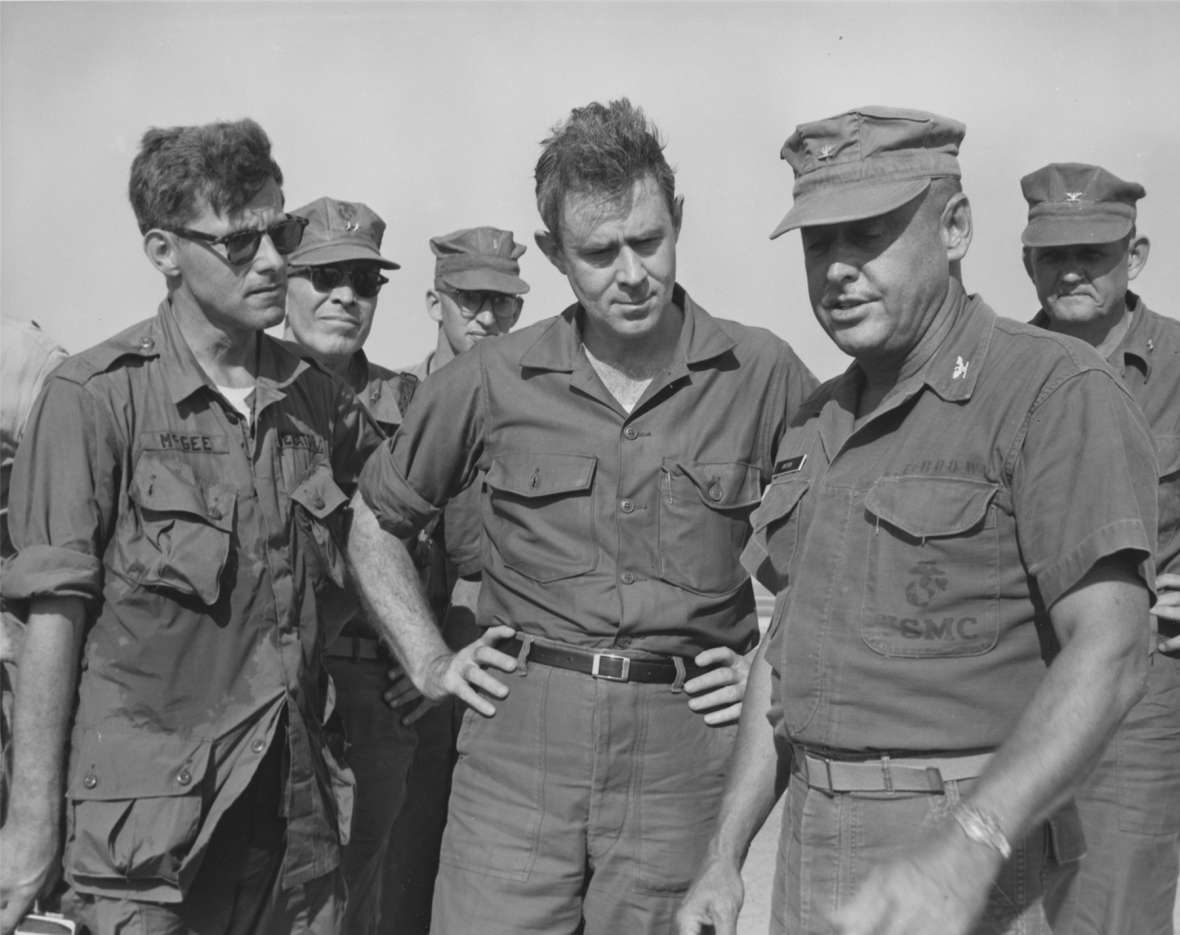
An FBI file
As much as he believed in protecting the international balance of power, the former University of Wyoming history professor also believed in academic freedom and the right of anti-war protesters to make their case in the public arena. That’s where he and LBJ diverged. It began with a Sunday afternoon phone call in the late Spring of 1965. McGee’s daughter, Mary Gale, answered the phone. “Sugar, is your daddy home,” inquired the President. “Who’s calling,” Mary Gale wanted to know. “It’s Lyndon, sugar. Tell him it’s Lyndon.” [10]
The President launched into a denunciation of anti-war protesters. Johnson claimed the Communists were spurring the protests. Referring to J. Edgar Hoover, then director of the FBI, he made the startling claim that “Hoover has most of these groups infiltrated.” He added, “Edgar Hoover is very unhappy about this.” Johnson baited his pro-war ally, telling him Hoover has “a big file” to share.
McGee was personally familiar with the “quality” of the information that could find its way into the Bureau’s secret files. They had a thick one on him, opened when “an informant who has furnished reliable information in the past,” told the FBI that UW professor Gale McGee sought a visa to visit the Soviet Union in 1956. McGee was one of the first non-governmental officials to lead a tour behind the Iron Curtain. After McGee was elected to the Senate, the Lincoln County Federation of Republican Women wrote Hoover expressing concern over “the ever-smothering flood of Communism,” adding, “I understand that you have our Terrible Gale McGee (U.S. Senator) under your watchful eye, thank heavens for that.” [11]
Hoover’s notes in the file disclose the FBI investigated him but never found reason to be concerned about Gale McGee. Having had his own personal experience with FBI files, the Wyoming senator was unlikely to act without seeing the file it had on the anti-war movement and judging it for himself. When McGee allowed that the information was “concerning,” the President offered to send someone to talk to him.
Within a few days, FBI agent D.W. Bowers appeared at McGee’s office with the file. The senator was unimpressed. The agent left, having failed to secure McGee’s commitment to “expose” the Communists. Bower’s report to Hoover betrayed an annoyance that the Wyoming senator found it difficult to separate “honest, conscientious dissent from Communist activities.”
Making space for dissent
Instead of persuading McGee that he should support Johnson’s assertion about Communists leading the anti-war efforts, the experience persuaded the senator that the time had come for him to speak out in favor of academic freedom. Three months after his telephone call from LBJ, McGee rose to speak on the Senate floor, giving a speech that was not what Johnson had hoped for. He said that among the protesters there were likely “professional revolutionaries and malcontents as well as bona fide academics and students.” Without mentioning Johnson or Hoover, McGee said, “I realize that perhaps there are a few who think they (the protesters) take their orders from Moscow or Beijing.”
McGee reminded his senate colleagues that he had always encouraged dissent and was seeking “a dialogue rather than a monologue.” He warned against “witch hunts,” a barely-veiled reference to Hoover’s clandestine work to infiltrate anti-war groups. Perhaps he was remembering the winter of 1947-48, when he and other University of Wyoming faculty resisted trustee pressure to investigate textbooks in use on campus to determine if any were “subversive or un-American.” In the Senate, the former college professor worried aloud that stifling dissent would endanger academic freedom. [12]
Civil disagreement
If Gale McGee is to be remembered for his support for an unpopular war, his steadfast advocacy for the rights of those who opposed the war to have a meaningful voice in the public arena is also part of his legacy. In the context of today’s divisive politics, it should be remembered as well that Gale McGee, and those like George McGovern and Frank Church who opposed the war, never engaged in a single personal attack on the other. Facts mattered as much as opinion. They arrived at different conclusions honestly, not to appeal “to the base” on cable news programs.
The great difference between then and now is that at the heart of their passionate debates was an abiding mutual respect. Once, when Church sent McGee an advance copy of an article he wrote critiquing the Wyoming senator’s views on the war, McGee responded, “While we certainly have some differences of opinion on the best course of action, I thought your presentation was a most excellent, concise, and forthright exposition of your point of view and should be considered by all who would understand the many complex aspects of our involvement in Vietnam.” [13]
In McGee’s FBI file is a large cache of information the Bureau collected when President Jimmy Carter nominated the Wyoming senator to be Ambassador to the Organization of American States following McGee’s 1976 Senate-race loss to Republican Malcolm Wallop. McGee was asked whether he had given political contributions to any candidate in the last five years, i.e. the time leading up to the end of the war. McGee had given only two such contributions. He wrote two one-hundred-dollar checks. One to Frank Church, the other to George McGovern. [14]
Perhaps Gale McGee’s greatest legacy is leaving us with a memory of what we once were, what politicians once were, and how to get there again.
[1] Bill Sniffin, “What I’ll remember about the campaign of 1976,” Wyoming State Journal, November 4, 1976, 6.
[2] Telephone call, LBJ to Lippman, December 1, 1963, http://web2.millercenter.org/lbj/audiovisual/whrecordings/telephone/conversations/1963/lbj_k6312_lippmann.mp3, accessed July 20,2015.
[3]Joe Frantz Oral History, interview with McGee, p. 38, box 956, Gale W. McGee Papers, Collection no. 09800, American heritage center, University of Wyoming (hereafter “McGee papers”).
[4] Congressional Record, February 17, 1965, 2869. The entire debate is on pages 2869-2990
[5] William Small, “Congress, Television, and War Protests,” www.americanheritage.com/category/article-keywords/vietnam-wars, accessed July 20, 2015.
[6] Letter, McGee to Nebraska Selective Service Board, undated, file: “McGee Memoirs: UW or Wyoming,” box 943, McGee papers.
[7] “Founding Fathers and Entangling Alliances,” box 939, McGee papers.
[8] J. Fred Rippy, Bygones I Cannot Help Recalling, Austin, TX: Steck-Vaughn Publisher, 1966, 114.
[9] Letter Coad to McGee, March 6, 1968, folder 2, box 186, McGee papers.
[10] LBJ to McGee, recorded phone call, April 29, 1965, citation no. 7384 Speaker:tape:wh6504.07, http://web2.millercenter.org/lbj/audiovisual/whrecordings/telephone/conversations/1965/lbj_wh6504_o7_7384.mp3, accessed July 23, 2015.
[11] File of the Federal Bureau of Investigation, obtained through Freedom of Information Act, August 25, 2010, box not yet assigned, McGee papers.
[12] McGee speech, “Academic Freedom,” Congressional Record, July 27, 1965, 18304-5
[13] Letter, McGee to Church, March 14, 1966, Series 2.2, folder 12, box 30, Frank Church Papers, Boise State University.
[14] File of the Federal Bureau of Investigation, obtained through Freedom of Information Act, August 25, 2010, box not yet assigned, McGee papers.
Resources
Primary Sources

McGee, right, with author Rodger McDaniel in 1982, when McDaniel ran unsuccessfully for the U.S. Senate against Malcolm Wallop, who had defeated McGee six years earlier. McDaniel’s biography, ‘The Man in the Arena: the Life and Times of U.S. Senator Gale McGee,’ was published in 2018. Courtesy Rodger McDaniel. Coad, Arden. Letter to McGee, March 6, 1968. Folder 2, Box 186, Gale W. McGee Papers, Collection no. 09800, American Heritage Center. University of Wyoming, Laramie, Wyo. (Hereafter “McGee papers”).
- Federal Bureau of Investigation. File obtained through Freedom of Information Act, Aug. 25, 2010, box not yet assigned, McGee papers.
- “Founding Fathers and Entangling Alliances,” Box 939, McGee papers.
- Frantz, Joe. Oral History interview with McGee, p. 38, Box 956, McGee papers.
- Johnson, Lyndon Baines. Recorded phone call to McGee, April 29, 1965, Citation no. 7384 Speaker:tape:wh6504.07, accessed July 23, 2015 at http://web2.millercenter.org/lbj/audiovisual/whrecordings/telephone/conversations/1965/lbj_wh6504_o7_7384.mp3.
- ____________________. Telephone call to Lippman. Dec. 1, 1963, accessed July 20, 2015, at http://web2.millercenter.org/lbj/audiovisual/whrecordings/telephone/conversations/1963/lbj_k6312_lippmann.mp3.
- McGee, Gale. Letter to Frank Church, March 14, 1966, Series 2.2, Folder 12, Box 30, Frank Church Papers, Boise State University, Boise, Idaho.
- ___________. Letter to Nebraska Selective Service Board, undated, file: “McGee Memoirs: UW or Wyoming,” Box 943, McGee papers.
- ____________. Speech, “Academic Freedom,” United States Congressional Record, July 27, 1965, 18304-5.
- Rippy, J. Fred. Bygones I Cannot Help Recalling. Austin, Texas: Steck-Vaughn Publisher, 1966, 114.
- Sniffin, Bill. “What I’ll remember about the campaign of 1976,” Wyoming State Journal, Nov. 4, 1976, 6.
- United States Congressional Record, Feb. 17, 1965, 2869. The entire debate is on pp. 2869-2990.
- Secondary Source
- Small, William. “Congress, Television, and War Protests,” reprinted in Congress and the News Media, ed. Robert O. Blanchard (New York, 1974), 352–6., accessed July 20, 2015, at www.americanheritage.com/category/article- keywords/vietnam-wars.
Secondary sources
McDaniel, Rodger. The Man in the Arena: The Life and Times of U.S. Senator Gale McGee. (Lincoln, Neb.: University of Nebraska Press, 2018).
Illustrations
- The photo of Gale and Loraine McGee after the 1958 election is courtesy of Robert McGee. Used with permission and thanks.
- The photo of Sen. McGee and President Kennedy at the Cheyenne airport is from Wyoming State Archives. Used with permission and thanks.
- The photo of Sen. Gale McGee and Rodger McDaniel is courtesy of the author. Used with permission and thanks.
- The rest of the photos are from the Gale W. McGee papers at the American Heritage Center, University of Wyoming. Used with permission and thanks. The wedding photo is from Box 9, Folder 3 of the McGee papers; the photo with LBJ is from Box 12, Folder 1; the wedding photo is from Box 14, Folder 5.
